
History of the Atlantic Cable & Undersea Communications
from the first submarine cable of 1850 to the worldwide fiber optic network
Sir Robert Peel, John C. Deane, and the 1865 cable
 |
History of the Atlantic Cable & Undersea Communications |
|
Sir Robert Peel, John C. Deane, and the 1865 cable |
|
Introduction: In the summer of 1865, seven years after the failure of the 1858 cable, another attempt was made to lay a cable between Ireland and Newfoundland. Brunel’s Great Eastern had just been converted to a cable ship to be used for the expedition. The laying of the cable was begun from Valentia, Ireland, the cable being brought to land in Foilhummerum Bay on 21 July 1865. The landing of the shore end of the cable was the occasion of a great celebration, present among others being the Knight of Kerry and Sir Robert Peel (1822-1895, the third baronet of that name, and son of the late Prime Minister), who at the time was chief secretary to the Lord Lieutenant of Ireland. The Knight of Kerry introduced Sir Robert with these words: "I will take the liberty of asking you to give three cheers for a gentleman who has come here at great inconvenience, and has done us a very great honour in doing so, and who deserves them, no only from his position and character, but also from the interest which he has always shown in this undertaking. I call upon you to give three hearty cheers for Sir Robert Peel." Peel made a short speech to the assembled crowd, and concluded with: "Now, gentlemen, probably one of the first messages that will be sent by this Cable will be a communication from the Sovereign of this great country to the great ruler of the mighty continent at the other side of the Atlantic. I will ask you to give three cheers for her Majesty the Queen. (Cheers). I give you, with hearty good will, health and happiness to the ruler of the United States, President Johnson." (The toast was received with loud cheers.) [Quotes from W.H. Russell: The Atlantic Telegraph] The voyage began uneventfully, but was soon disrupted by damage to the cable caused by broken pieces of the armouring wires, at first thought to be sabotage but later proved to be accidental. Then on 2 August 1865, after 1200 miles of the cable had been laid, disaster struck when the cable broke and sank 2½ miles into the ocean, and all attempts at recovery were unsuccessful. After the loss of the cable the ship returned to Ireland, arriving there on 17 August 1865, and on that date John C. Deane sent a letter to Sir Robert Peel describing the problems of the expedition. Deane's letter no longer survives, but Peel's reply is reproduced and transcribed on this page. It is not known what position Deane held with the cable companies when he wrote the letter to Peel at the conclusion of the 1865 sailing of the Great Eastern; William H. Russell and Robert Dudley were the official chroniclers of this expedition. Later in 1865, when the Anglo-American Telegraph Company was formed to lay the 1866 cable, Deane became Secretary of the company and sailed on the 1866 expedition in that capacity. Deane kept a diary of the 1866 expedition, which Henry Field quoted from extensively in his book on the Atlantic Cable. See also the Manufacture of the 1865 and 1866 Cables, Daniel Gooch's letter about the loss of the cable; W.H. Russell's book, with lithographs from original drawings made by Robert Dudley, on the 1865 Great Eastern cable laying voyage, including attempts to recover the lost cable; John C. Deane's diary of the 1865 expedition; an 1884 article by James Graves on the failure of the 1865 Atlantic cable; and the story of the Recovery of the Cable in 1866, which draws extensively on Deane's diary of that voyage.
|
||
Click on each image for a full-size view of the letter page. Sir Robert Peel (third baronet) to John C. Deane |
||
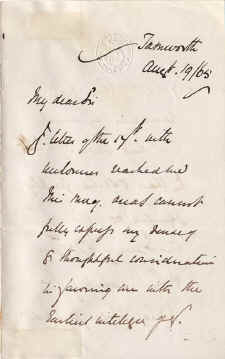 |
Tamworth My dear Sir Yr. letter of the 17th with inclosures reached me this mng. and I cannot fully express my sense of yr. thoughtful consideration in favoring me with the earliest intelgnce of yr. |
|
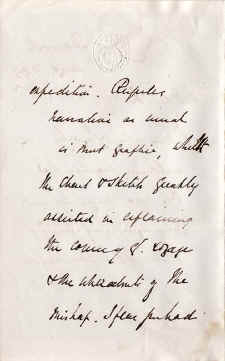 |
expedition. Russell's narrative as usual is most graphic, whilst the chart & sketch greatly assisted in explaining the course of yr. voyage & the whereabouts of the mishap. I fear you had |
|
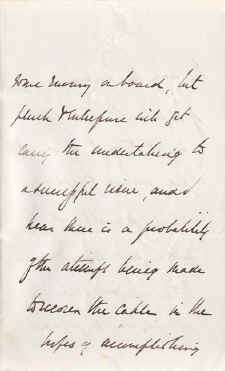 |
some enemy on board, but pluck & enterprise will yet carry the undertaking to a successful issue, and I hear there is a probability of the attempt being made to recover the cable in the hopes of accomplishing |
|
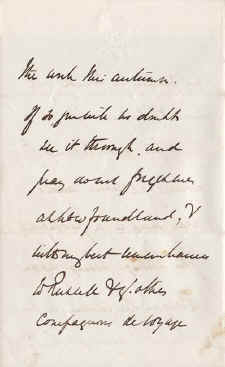 |
the work this autumn. If so you will no doubt see it through, and pray do not forget me at Newfoundland, & with my best remembrances to Russell & other companions de voyage |
|
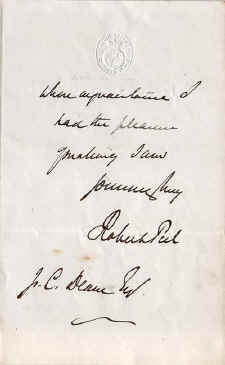 |
whose acquaintance
I had the pleasure of making. I am J. C. Deane Esq.
|
|
Here's the full text of the letter, edited only for punctuation: |
||
Sir Robert Peel (third baronet)
to John C. Deane Tamworth My dear Sir Your letter of the
17th with inclosures reached me this morning and I cannot fully express
my sense of your thoughtful consideration in favoring me with the earliest
intellignce of your expedition. Russell's narrative as usual is most graphic,
whilst the chart & sketch greatly assisted in explaining the course
of your voyage & the whereabouts of the mishap. I fear you had some
enemy on board, but pluck & enterprise will yet carry the undertaking
to a successful issue, and I hear there is a probability of the attempt
being made to recover the cable in the hopes of accomplishing the work
this autumn. If so you will no doubt see it through, and pray do not forget
me at Newfoundland, & with my best remembrances to Russell & other
companions de voyage whose acquaintance I had the pleasure of making.
I am J. C. Deane Esq. Return to the Atlantic Cables index page |
||
|
Last revised: 29 December, 2012 |
|